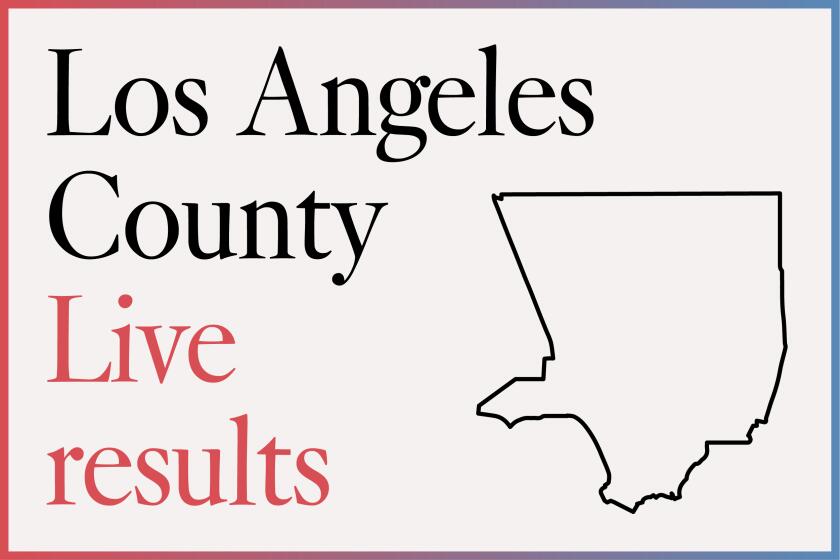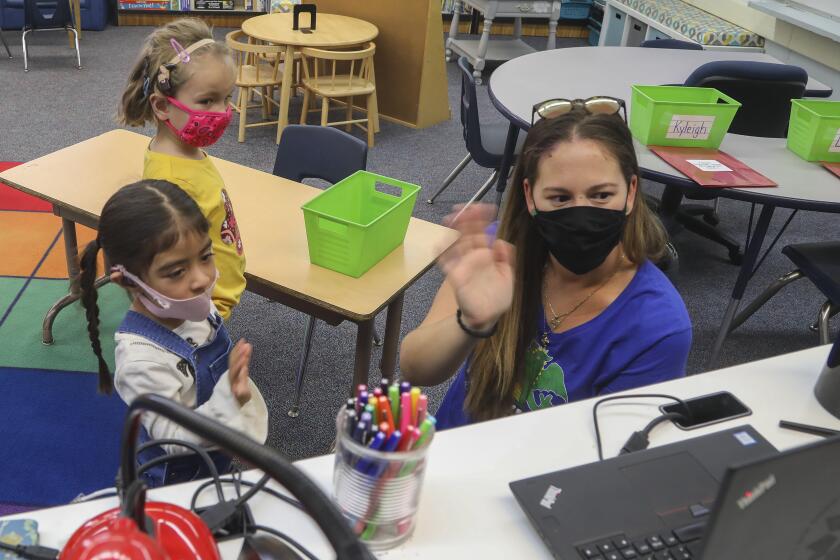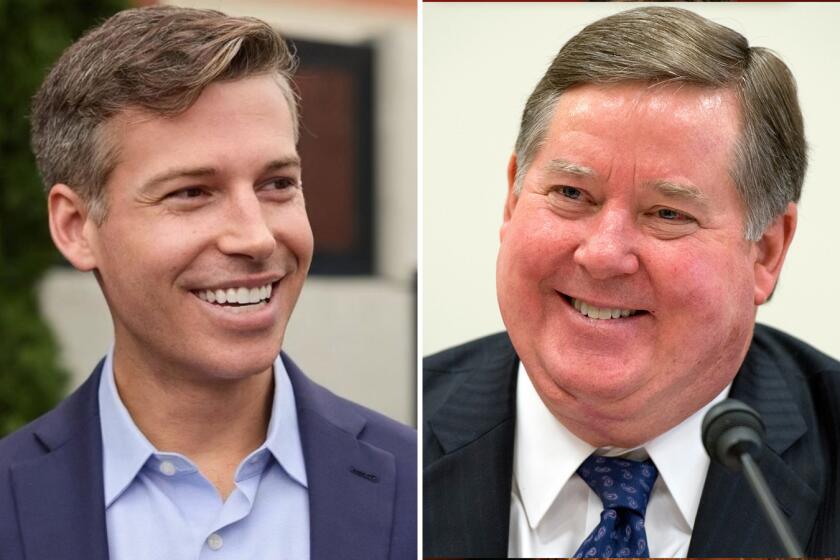Split results in two L.A. school board races suggest a pro-charter school tilt
The titans of Los Angeles school politics — charter-school advocates and the teachers union — have fought to an expensive draw in Tuesday’s school board races, with a winner expected from each side and a board majority that could tilt in favor of charters.
In District 3, which covers most of the western San Fernando Valley, union-backed incumbent Scott Schmerelson led charter-backed Marilyn Koziatek by 54% to 46% of votes cast Wednesday evening. In District 7, which stretches from South L.A. to the Harbor area, charter-backed Tanya Ortiz Franklin was in front of union-backed Patricia Castellanos by a tally of 58% to 42%.
Although more votes remain to be counted, the margins for the leaders appear large enough to hold. Koziatek, the closer second-place finisher, essentially conceded in a statement provided to The Times on Wednesday.
Also, voters living within L.A. Unified boundaries overwhelmingly passed Measure RR, which will provide $7 billion for campus repairs, modernization and technology.
These school board contests are likely to go down as the nation’s most expensive board elections to date, with combined reported spending nearing $17.5 million by Wednesday, with additional financial filings still to come. The previous high-water mark was $17 million in 2015, which was regarded as a national record at the time.
Supporters of charters, backed by a relatively small number of wealthy donors, vastly outspent unions — mostly the teachers union — by more than 5 to 1 in District 3 and more than 3 to 1 in District 7.
“This election has turned out to be a very expensive jump-ball,” said Dan Schnur, who teaches political communications at USC and UC Berkeley. He added: “$17 million later, and both sides end up almost exactly where they started.”
Nonetheless, at least a small presumed edge goes to charters because charter-backed Franklin will replace termed-out board President Richard Vladovic. In the last of his three terms, Vladovic seemed more frequently allied with unions than charters.
However, the shift could be subtle with Franklin, 36, whose career has been in traditional public schools rather than charters. She formerly taught at a district middle school, earned a law degree and currently works as an administrator within a group of L.A. schools managed by a nonprofit, the Partnership for Los Angeles Schools. The Partnership abides by district policies and union contracts.
“It’s really about centering on kids for me,” Franklin said Wednesday. “It always has been.”
The teachers union wants to limit the growth of privately managed charters — most of which are nonunion. Critics say charters have depleted traditional schools of students and resources, and their growth is especially problematic during the current period of declining enrollment.
Charter advocates insist their schools offer parents high-quality alternatives. They are particularly concerned about new state and local rules that would make it easier for school districts to close existing charters and reject petitions for new ones. Under the prior rules, districts had limited authority to prevent a new charter from opening.
Close to one in five district students attend a charter.
The campaign dynamic — charters versus unions — oversimplifies existential questions facing L.A. Unified. Long-standing problems include serious financial strains and ongoing contention over how best to serve low-income Black and Latino students who are lagging academically and lost more ground after campuses closed on March 13 because of the coronavirus pandemic. They have yet to reopen in Los Angeles, except for limited tutoring.
While the big funders pay for endless mailers, calls and online ads, the campaign pitch typically focuses on other things.
The campaign on behalf of Franklin emphasized her background as an educator and, in a series of harsh mailers, the lack of such a background in Castellanos. Steve Barkan, a consultant for Castellanos, said the attacks unfairly dismissed Castellanos’ role as an active district parent and a community organizer on behalf of families.
Castellanos strongly identified with the union’s agenda on charters and other issues.
While Schmerelson had supported Castellanos, he said he looks forward to working with Franklin.
“I think she would be very fair and see both sides,” he said.
Even though he’s an incumbent, Schmerelson’s victory felt like an upset — given the $3 million in harsh attacks ads against him that were frequently misleading. Moreover, voters in that district had turned out the incumbent in three of the four prior elections.
County officials have made it easier for elementary schools to reopen for their youngest students under waivers, dropping a requirement to show union support.
A retired principal and former Spanish teacher, Schmerelson, 69, said he received emails from people he didn’t know who were “horrified by the slew of hateful ads. I told them to call your child’s teacher or the school’s custodian and ask how they feel about me, and if I’m doing a good job.”
He credited dedicated volunteers in his own comparatively low-budget campaign — which was separate from the union efforts — for making direct contact with more than 100,000 individual voters. Because of the pandemic, these volunteers had to abandon the traditional ground game of knocking on doors.
“We were making this up as we went,” said teacher and volunteer field director Brent Smiley. “At the beginning of all this, we already felt like it was a David-versus-Goliath match. Then they went ahead and took away our sling. It was so strange.”
By midday Wednesday, the ongoing count of “semi-official” returns, as the county registrar terms them, tallied about 220,000 ballots in this race, compared to 37,000 in 2015, when board races were part of low-turnout municipal elections. A similar explosion in voting occurred in District 7.
“Having a lot more voters pay attention to the issue of education and how schools are operating in the city is incredibly important,” said Gregory McGinity, the executive director of California Charter Schools Assn. Advocates. His group ran the independent campaign on behalf of Koziatek, a district parent who manages community outreach at a local charter.
McGinity said that the importance of Franklin’s victory is bringing more of an “outsider perspective” to the Board of Education.
More to Read
Sign up for Essential California
The most important California stories and recommendations in your inbox every morning.
You may occasionally receive promotional content from the Los Angeles Times.













